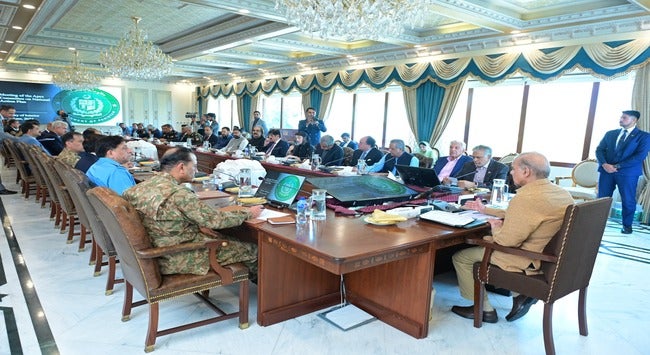Operation Azm-i-Istehkam Launched:
Pakistan Combats Terrorism
Imran Ahmed, Charukeshi Karikalan
5 July 2024Summary
On 22 June 2024, the Pakistan government launched Operation Azm-i-Istehkam (Resolve for Stability), a counterterrorism initiative aimed at addressing urgent security concerns through the continuation of intelligence-based operations, alongside regional cooperation and socioeconomic interventions. While the initiative responds to a rise in terror incidents and violence and to address cross-border terrorism as well as to reassure international partners, it has, however, been met with opposition due to concerns over transparency.
On 22 June 2024, the Pakistan government approved Azm-i-Istehkam (Resolve for Stability), the state’s re-energised counterterrorism campaign. The Prime Minister’s Office announced that the operation would involve intensified counterterrorism efforts, alongside regional cooperation and socioeconomic measures, to discourage extremist tendencies. The Prime Minister’s Office called Azm-i-Istehkam part of a broader effort to reinvigorate the National Action Plan, which was initially implemented in 2014. This initiative follows previous strategies, including unsuccessful attempts by the Imran Khan government to negotiate with the Tehreek-e-Taliban Pakistan (TTP) and grant amnesty to militants.
With the TTP unilaterally ending the ceasefire agreement with the government in November 2022, the decision to launch Operation Azm-i-Istehkam signals a shift towards a more proactive stance against militant groups. To quell escalating violence, Pakistan also announced a military operation in April 2023, during Shehbaz Sharif’s previous tenure as prime minister but an official military campaign never commenced as the country was in danger of defaulting on its debt amidst an economic crisis.
Operation Azm-i-Istehkam sparked dissent within the Parliament as several political parties have expressed reservations, with Jamiat Ulema-e-Islam (F) [JUI-(F)] Chief Maulana Fazlur Rehman criticising the campaign as an ‘instability operation’ that could further destabilise the country. Moreover, concerns from opposition parties such as the Pakistan Tehreek-e-Insaf and JUI-F centred on the lack of parliamentary involvement and called for detailed briefings to understand the operation’s scope and implications. In defence, the government clarified that Azm-i-Istehkam is not a large-scale military operation like Zarb-e-Azb or Rah-e-Haq, which involved significant displacements.
The escalation of terrorism in Pakistan has also been a significant regional and international issue. China has expressed deep concern over the security of its citizens and projects in Pakistan, particularly those under the China-Pakistan Economic Corridor. Incidents such as the March 2024 suicide bombing in Shangla and the 2021 bus bombing in Dasu underscore these anxieties and highlight persistent security challenges faced by Chinese personnel working on infrastructure projects in Pakistan. The Pakistani government has responded by compensating the victims’ families and intensifying security measures. Interior Minister Mohsin Naqvi has emphasised the protection of foreigners, especially Chinese citizens, as a “top priority”, condemning efforts by “nefarious elements” to disrupt development. Chinese President Xi Jinping has also expressed expectations for “a safe, stable and predictable business environment” during discussions with Sharif in early June 2024. Operation Azm-i-Istehkam, launched in response to such security concerns among other reasons, aims to reassure China and other international partners about the safety and stability of investments in Pakistan.
Despite concerns over Pakistan’s shifting priorities and geopolitical alignments, the United States (US) has affirmed renewed interests in the threat of terrorism in the ‘Af-Pak’ region. In a Joint Statement at the US-Pakistan Counterterrorism Dialogue in May 2024, both states “emphasised the importance of expanded counterterrorism collaboration and capacity building”. With renewed focus on countering militancy in the area, visits by high-level US Central Command officials have taken place and the US has affirmed its support for Pakistan’s efforts under Operation Azm-i-Istehkam. While Pakistan’s Ambassador to the US has requested for arms for the operation, Defense Minister Khawaja Asif clarified that Pakistan would conduct the operation independently. At the same time, the US maintains a cautious stance due to regional dynamics, including its strong ties with India and sensitivities around military aid allocations.
Pakistan also faces significant challenges from cross-border terrorism originating in Afghanistan, exacerbated by strained diplomatic ties and increasing anti-Pakistan sentiments, most recently due to the crackdown of Afghan refugees living in Pakistan. The Inter-Services Public Relations Director, General, Maj-Gen Ahmed Sharif, highlighted ‘concrete evidence’ of TTP militants using Afghan soil for attacks on Pakistan and linked the planning of attacks, including the targeting of Chinese engineers, to Afghanistan-based militants. However, both Afghanistan and the TTP have denied the use of Afghan soil for attacks inside Pakistan. Pakistan, however, appears unconvinced. Asif remarked that Operation Azm-i-Istehkam may target TTP’s sanctuaries across the border.
While Operation Azm-i-Istehkam signifies Pakistan’s efforts to enhance security for its citizens and foster a conducive business environment, as the twelfth major anti-Islamist operation since 2007, it underscores the need to differentiate itself from previous efforts by prioritising transparency and effectiveness. This is particularly crucial under a coalition government where inclusive decision-making to address diverse viewpoints is needed to maintain internal political cohesion. It must also be noted that the proliferation of political violence against the state, its symbols, institutions and citizens, reflects a need for political solutions, alongside other measures, to address systemic failures in governance, and political exclusion, as well as to redress longstanding historical grievances. As the US’ withdrawal from Afghanistan has shown, military might alone is insufficient to stop the rise of political violence and terrorism.
. . . . .
Dr Imran Ahmed is a Research Fellow at the Institute of South Asian Studies (ISAS), an autonomous research institute at the National University of Singapore (NUS). He can be contacted at iahmed@nus.edu.sg. Ms Charukeshi Karikalan is a Research Intern at the same institute. She can be contacted at isav32@partner.nus.edu.sg. The authors bear full responsibility for the facts cited and opinions expressed in this paper.
Pic Credit: Government of Pakistan Twitter Account
-
 More From :
More From :
-
 Tags :
Tags :
-
 Download PDF
Download PDF



